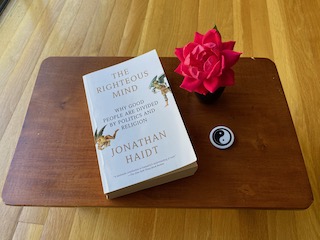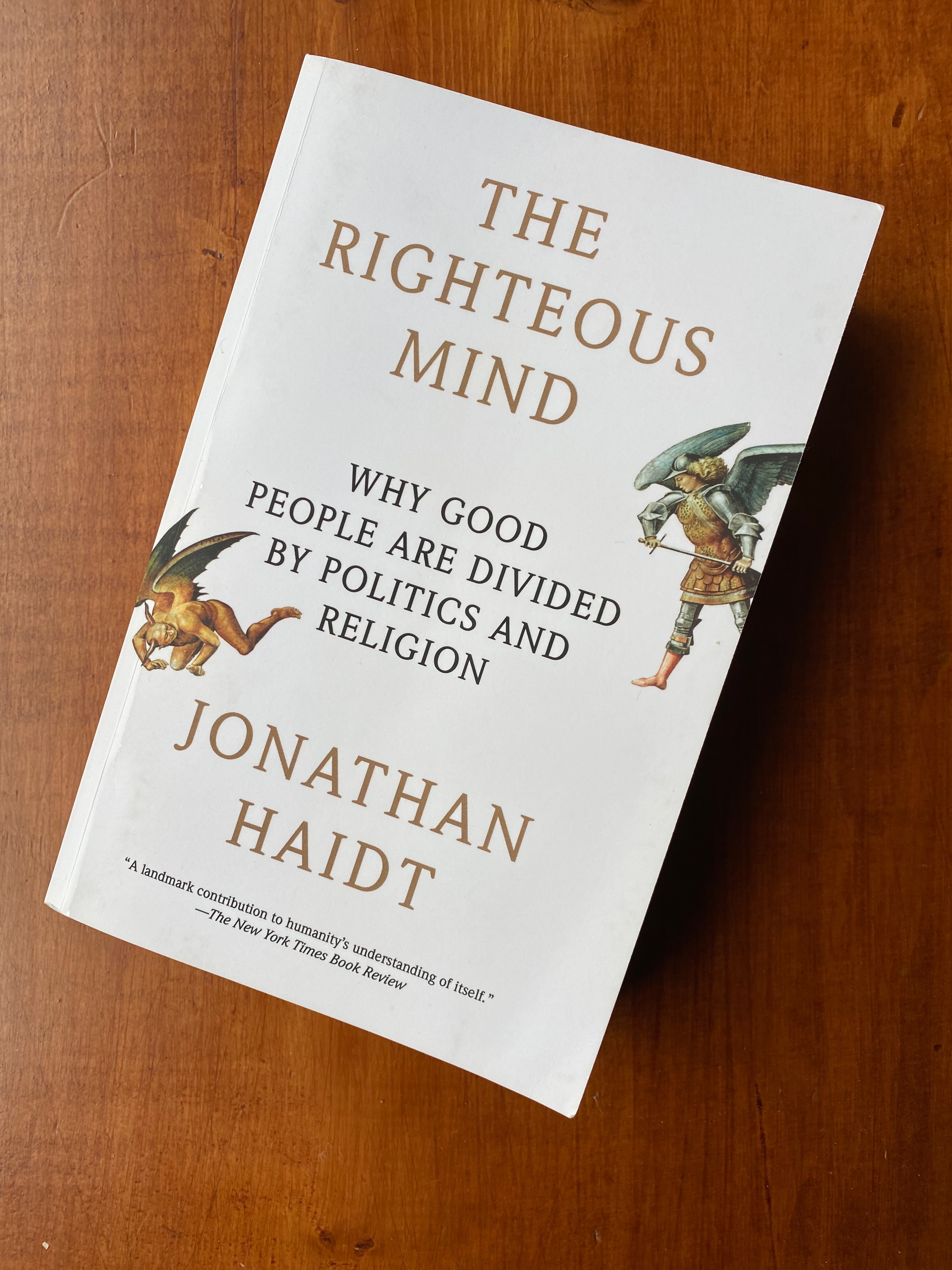Jonathan Haidt’s book, The Righteous Mind, is helping me better understand some important dynamics of the liberal/conservative divide. I can appreciate some of the things driving the thinking of others, even if I don’t agree with them. And I find that we sometimes have more in common than I realized.

In my previous post I discussed Haidt’s first two major points. He shows that the basis of our political and moral decisions is based more on instinct than reason, and he examines the difference between the left and right in regard to the five main foundations of moral judgment.
Haidt’s third major point is that human beings thrive when we are connected to others and feel part of something greater than ourselves. Being part of the whole lifts us out of the mundane reality of everyday life. This gives life meaning, and we need one another for that experience.
Groups of people who agree on a moral worldview offer a sense of support and belonging to their members. This creates something that Haidt calls moral capital—his term for the trust, accountability, and buy-in that allows a group of people to work together, trade with each other, and achieve what they could not accomplish on their own. Moral capital gives individuals confidence that their investment of time, energy, and resources will be rewarded. Moral capital encourages people to work in a way that benefits not only themselves, but the others in their community.
When people can trust one another, they don’t have to hold back out of fear that their hard work will be taken advantage of. Their shared commitment to act for the good of the group brings out the best in its members. Moral capital is a source of real power, and it allows the group to be highly effective in what they undertake together.
In many ways, a moral community operates like a powerful hive. To belong, individuals must sacrifice some personal freedom and act for the good of others in the hive. In this way the community multiplies the power of an individual, making itself into a cohesive organism able to survive challenges and defend against enemies.
Here’s what Haidt has to say about building a strong moral society, by which he means a society with ample moral capital:
“Moral communities are fragile things, hard to build and easy to destroy. When we think about very large communities such as nations, the challenge is extraordinary and the threat of moral entropy is intense. There is not a big margin for error; many nations are failures as moral communities, particularly corrupt nations where dictators and elites run the country for their own benefit. If you don’t value moral capital, then you won’t foster values, virtues, norms, practices, identities, institutions, and technologies that increase it.
“Let me state clearly that moral capital is not always an unalloyed good. Moral capital leads automatically to the suppression of free riders, but it does not lead automatically to other forms of fairness such as equal opportunity. And while high moral capital helps a community to function efficiently, the community can use that efficiency to inflict harm on other communities. High moral capital can be obtained within a cult or a fascist nation, as long as most people truly accept the prevailing moral matrix.
“Nonetheless, if you are trying to change an organization or a society and you do not consider the effects of your changes on moral capital, you’re asking for trouble. This, I believe, is the fundamental blind spot of the left. It explains why liberal reforms so often backfire, and why communist revolutions usually end up in despotism. It is the reason I believe that liberalism—which has done so much to bring about freedom and equal opportunity—is not sufficient as a governing philosophy. It tends to overreach, change too many things too quickly, and reduce the stock of moral capital inadvertently. Conversely, while conservatives do a better job of preserving moral capital, they often fail to notice certain classes of victims, fail to limit the predations of certain powerful interests, and fail to see the need to change or update institutions as times change.” (pp. 342-343)
We all tend to believe that we own the moral high ground. We gather with like-minded people and share a hive mindset. The sense of community is enjoyable, and we find empowerment in aligning with those who think like us. Belonging to a hive gives us a buzz, so to speak.
Inside communities like these, politics takes on a religious fervor. The left and right come to view each other not as opponents, but enemies. Without shared moral capital, the two sides cannot work together. This is the morass we’re in, and we can’t get out of it by trying to change each other’s mind.
We need a way transcend the impasse we’ve reached. Einstein said that problems are never solved on the same level at which they are created. We must orient ourselves according to a higher vantage point. It’s imperative to elevate our perspective and our dialogue so we can talk to one another. Our challenge is to release our death-grip on being right, and to cultivate moral humility.
Moral humility means easing our battle stance. In conversation, it means willingness to listen. It requires resisting the urge to be right, and refraining from attack. Moral humility seeks instead to understand the fears that drive the other person. This is not easy. Moral humility makes our judging mind give up the driver’s seat.
This is not a call to abandon what we think is right. It is rather about expanding our moral sense to reach beyond our hive. Moral humility does not mean that anything goes. It means noticing when a puffed-up sense of righteousness threatens to take us over.
If I’m convinced that I’m right and you’re wrong, I can’t see anything new; I can only see what I already know. Moral humility means I’m less invested in being right, and more invested in discovering how the world works.
This can look a lot like curiosity, and a sincere interest in learning from each other. Practicing moral humility together allows us to exchange ideas, not just shout at one another. Perhaps it even helps us create a place where, individually and collectively, we all can thrive.


